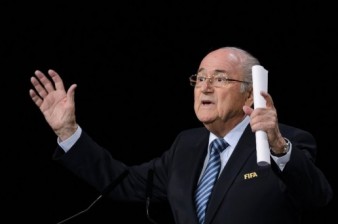
29/05/2015 21:35
Sepp Blatter wins FIFA re-election the old fashioned way
Immovable. Untouchable. Oddly impressive, even.
Sepp Blatter was elected to his fifth term as president of FIFA on Friday. It came just days after 14 former or current executives and associates were indicted by the U.S. Justice Department in sweeping charges of racketeering stemming from an alleged widespread culture of bribery and kickbacks.
In the end though, it hardly mattered. After blocking Blatter from getting a two-thirds majority on the first vote, Prince Ali bin al-Hussein of Jordan – needing to switch some 31 votes his way – withdrew from the race before the conclussion of the second majority vote. And with that, Blatter is back for four more years.
If the images of FIFA execs getting hauled out of swanky Zurich hotels wasn't going to do it, almost nothing short of Blatter himself getting legally rolled up on, will.
This was a testament to the power the 79-year-old Blatter has amassed over four decades with FIFA, including the last 17 as president, mainly in gaining unshakable support in many small, often poor, nations.
It was also something straight out of America's big-city mayoral party machines – New York's Tammany Hall and James Michael Curley's Boston stretching through Richard J. Daley's Chicago and even Marion Barry's Washington. Everything was based on caring for ward bosses so when it mattered, they'd deliver the votes.
If you grease the skids and take care of the corners then no amount of cries of scandal from the wealthy elite, howls from the media and complaints, or even convictions, of illegal behavior can unseat you. It can actually strengthen everyone's resolve.
FIFA has 209 federations and each has an equal vote, a system where Comoros counts as much as China.
Throughout his tenure the Swiss-born Blatter has curried favor with many of the poorer nations (more than half the population of Comoros, for instance, live on less than $1.25 per day). Some of it has been above the board and well-intended, say using FIFA's vast resources to fund much-needed grassroots efforts. Even if it was just hundreds of thousands of dollars, it represented a fortune in some places, not to mention a clear show of respect.
Whether all of the money made it to its intended target didn't matter. It would be the guy voting who would be able to skim – "honest graft" in the parlance of Tammany.
If, as critics would claim, Blatter was revered (or feared) because he looked the other way as nefarious business was conducted, or knew where bodies were buried, then, in the end, that worked too. Or, perhaps, it was just fear the next administration wouldn't be so generous.
Whatever it was, his base came through, thwarting an uprising attempt by many of the world's biggest nations, including the United States and most of Europe.
Blatter rode near unanimous support from Africa, Asia and many Central American and Island nation's to hold off a challenge by Prince Ali, the 39-year-old who ran on a campaign of transparency because, he aptly noted, this is a soccer federation and "there is no reason not to be transparent."
Transparency is a fine concept, but for many national federations that isn't the same as years of money coming in, one way or the other.
"The basic principle of FIFA is those that have more will share with those who have less," Blatter said earlier in the day. He was discussing a dispute between the Palestinian and Israeli Football Associations, which ended in a handshake, but it was also the clever insertion of a red meat political line.
Blatter campaigned on being who he was, unapologetic and lacking a hint of shame when he claimed he, of all people, was the right man to clean up the mess that he either inspired or didn't bother to fix all these years.
"You know me already," Blatter said. "I don't have to introduce myself. You know what you are dealing with. … I'd like to stay with you. I'd like to continue with you."
This is frustrating to the bigger nations, infuriating even. Yes, we know Sepp Blatter and it's a fairly loathsome relationship.
his is also how the world works, though. There is such a disparity between wealthy and poor, such disconnect between what is ethical and what is reasonable in business, such cultural diversity that it isn't easy to find a single issue that could topple a president who massages the group's interests so well.
Blatter was elected with what you could call a populist movement.
Scandal was essentially meaningless.
This is an organization, after all, that awarded its 2022 World Cup to Qatar even if it was well aware that stadium and infrastructure construction required the use of hundreds of thousands of poor, desperate migrant workers under the nation's kafala system, which is essentially as close to forced labor and slavery that modern humanity tolerates. That thousands will die building a playground was not a concern.
The voters haven't changed much since then.
While the election was successful, it wasn't easy for Blatter. This wasn't triumphant. For all of his democratic success here, he still must face the reality that many of the nations and fans that are most important to FIFA's bottom line are disgusted with him and suspicious of any of his actions.
It was striking when U.S. Soccer announced publicly on Thursday that it would vote against Blatter and instead support Ali.
"This is a vote for good governance," U.S. Soccer president Sunil Gulati stated.
Gulati is a pragmatic man, a Columbia University professor who generally won't attempt to rock the boat when he can attempt to reform from within. When he backed the challenger, many wondered if it was a sign that he believed Ali could win.
It turns out he couldn't.
The Prince made his pitch that he would "assure all our associations" were taken care of and that he would be "accountable to all of you and all of the world" and that he knew "FIFA is more than just one man."
All were either reassurances to smaller nations or direct shots at Blatter and his dual tract of look-at-me leadership while then claiming he's mostly powerless to do much.
"You can't ask people to behave ethically just like that," Blatter said Friday before later claiming he was just the man to somehow do it.
"We don't need revolutions," he said in his final campaign speech. "We need evolutions."
It was comical. It was effective.
"I am being held accountable for the current storm," Blatter said, earlier mentioning his suspicions on the timing of the indictments. "OK. So be it. I will shoulder it. I will take it upon myself. I will accept this responsibility … and I will fix FIFA with you … so that at the end of my term of office I will be able to hand over a strong FIFA that has survived the storm."
Now he'll get to the storm?
Whatever. It didn't matter. It never mattered.
Blatter leaned on his old voting blocs and won going away. He is 79, overloaded by controversy, saddled by criminal investigations on two continents, facing two upcoming controversial World Cups and lacking even a modicum of credibility.
Yet when his power was threatened, he just tightened his grip with the whitest of knuckles and called in favors born of favors past.
It was, on a certain level, a fairly breathtaking power play to behold – this arrogant, aging Swiss aristocrat brilliantly playing old-school street politics.
There will, no doubt, be the finest of celebratory champagnes drunk tonight. The sunset over Lake Zurich is said to be sublime.








